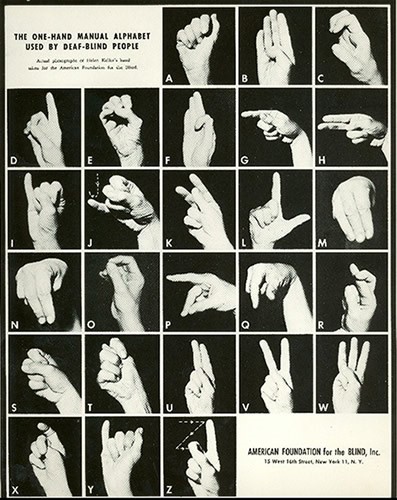Photograph of an American Foundation for the Blind poster entitled "The One-Hand Manual Alphabet Used By Deaf-Blind People. Actual photographs of Helen Keller's hand taken for the American Foundation for the Blind." The poster contains images of Helen Keller's hands forming individual letters.
One of the most important skills that Anne learned at the Perkins School for the Blind was the manual alphabet developed for deaf people. Each letter of the alphabet is formed with a different hand sign. For a person who is deaf-blind, words are signed into the palm of the hand. The person feels the movement of the fingers, which are surrounded by the listener's hand. The ability to sign into another's palm was a key part of Anne's later success in communicating with Helen Keller.
At Perkins Anne's hard work and keen mind resulted in her being chosen as the valedictorian of her class in 1886. She gave the following speech at the commencement ceremony:
All the wondrous physical, intellectual and moral endowments, with which man is blessed, will, by inevitable law, become useless, unless he uses and improves them...If a love for truth and beauty and goodness is not cultivated, the mind loses the strength which comes from truth, the refinement which comes from beauty, and the happiness which comes from goodness.
Full Transcript of Anne's Speech
Anne's Commencement Speech at the Perkins School for the Blind (June 1, 1886)
Today we are standing face to face with the great problem of life.
We have spent years in the endeavor to acquire the moral and intellectual discipline, by which we are enabled to distinguish truth from falsehood, receive higher and broader views of duty, and apply general principles to the diversified details of life. And now we are going out into the busy world, to take our share in life's burdens, and do our little to make that world better, wiser and happier.
We shall be most likely to succeed in this, if we obey the great law of our being. God has placed us here to grow, to expand, to progress. To a certain extent our growth is unconscious. We receive impressions and arrive at conclusions without any effort on our part; but we also have the power of controlling the course of our lives. We can educate ourselves; we can, by thought and perseverance, develop all the powers and capacities entrusted to us, and build for ourselves true and noble characters. Because we can, we must. It is a duty we owe to ourselves, to our country and to God.
All the wondrous physical, intellectual and moral endowments, with which man is blessed, will, by inevitable law, become useless, unless he uses and improves them. The muscles must be used, or they become unserviceable. The memory, understanding and judgment must be used, or they become feeble and inactive. If a love for truth and beauty and goodness is not cultivated, the mind loses the strength which comes from truth, the refinement which comes from beauty, and the happiness which comes from goodness.
Self-culture is a benefit, not only to the individual, but also to mankind. Every man who improves himself is aiding the progress of society, and every one who stands still, holds it back. The advancement of society always has its commencement in the individual soul. It is by battling with the circumstances, temptations and failures of the world, that the individual reaches his highest possibilities. The search for knowledge, begun in school, must be continued through life in order to give symmetrical self-culture.
For the abundant opportunities which have been afforded to us for broad self-improvement we are deeply grateful.
We thank His Excellency, the Governor, and the legislature of Massachusetts, and the governors and legislatures of the several New England states, for the most generous and efficient aid they have given our school.
We thank our trustees for the zeal and invariable interest which they have shown in all that concerns our well-being.
Director, teachers and matrons: we enter life's battle-field determined to prove our gratitude to you, by lives devoted to duty, true in thought and deed to the noble principles you have taught us.
Schoolmates: though the dear happy years we have spent together are over, yet the ties of friendship, and an enduring love and reverence for our school, and the sacred memory of her whom God has called from her labor of love to be an unseen but constant inspiration to us through life, are bonds of union that time and absence will only strengthen.
Fellow-graduates: duty bids us go forth into active life. Let us go cheerfully, hopefully, and earnestly, and set ourselves to find our especial part. When we have found it, willingly and faithfully perform it; for every obstacle we overcome, every success we achieve tends to bring man closer to God and make life more as he would have it.
